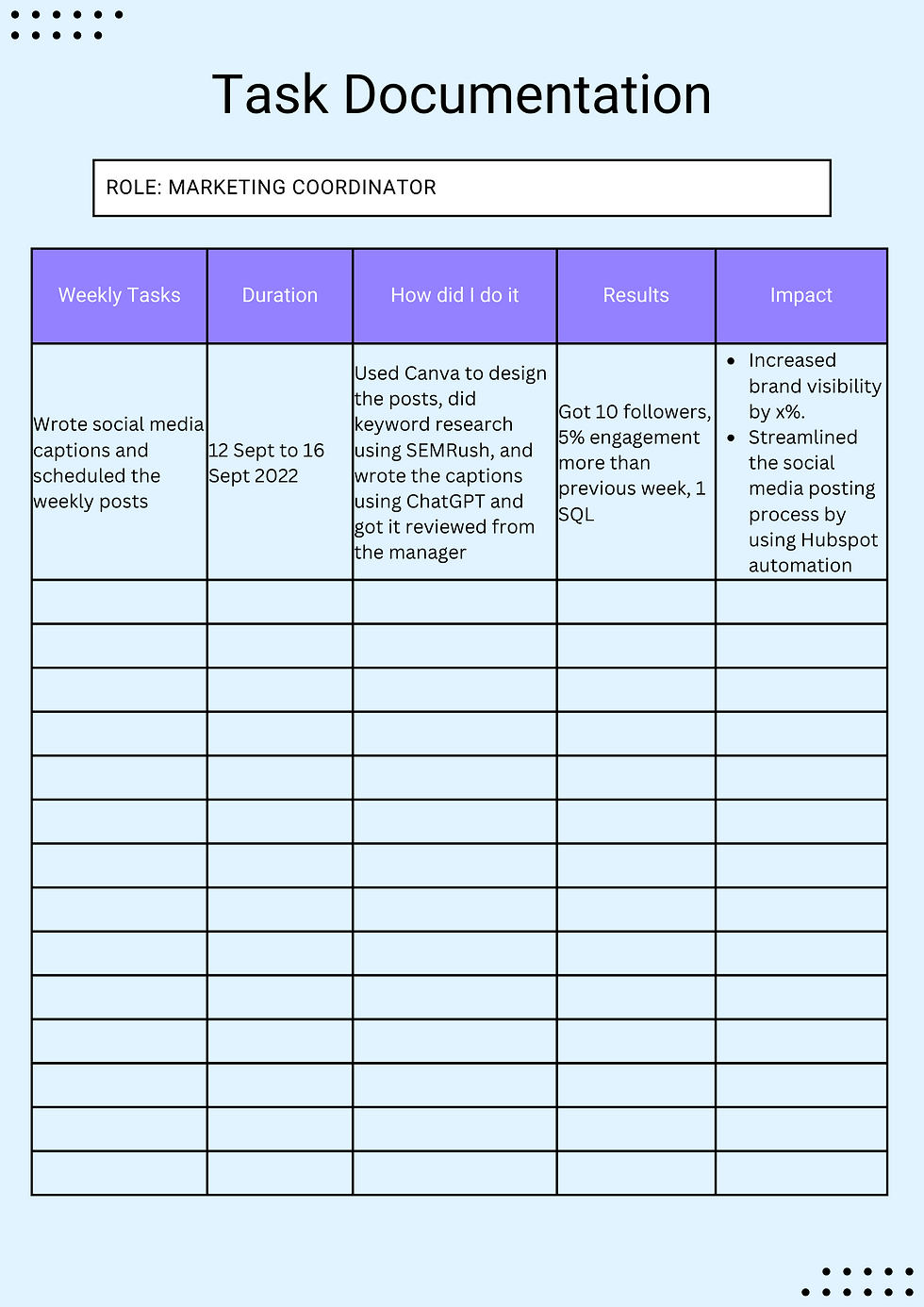
Staying organized and efficient is essential to succeed in your career. One effective way to achieve this is by documenting your weekly tasks at work. While it might seem like a simple practice, the benefits are substantial. Also, it can help you to stand out from the crowd, especially in this competitive job market.
In this blog, we'll discuss:
The benefits of documenting your weekly tasks
How to document your tasks
Tips to write the documentation
Types of achievements to track
Why do you need to document your tasks?
Often, you get caught up in the whirlwinds of projects and deadlines, forgetting to notice what you've done, how you did it, and the results. You feel you haven't done anything as much as other team members, especially when you're searching for a new job or wanting a promotion. But what you need to do is to track what you've done so far. Therefore, it is crucial to document your tasks every week.
Some of the benefits of documenting your weekly tasks include;
Combating imposter syndrome
Stay organized and finish tasks on time
Create a knowledge base of best practices for your team
Improve the quality of the process
Self-reflection on your performance
Provide visibility to your team members
Use data to ask for promotions
Creating a system for onboarding new employees
Reduce the load on memory during job search
Showcase your achievements during interviews.
Let's discuss this in detail.
Combating imposter syndrome
Imposter syndrome is a nagging feeling that you're not qualified for your job, and sooner or later, someone will figure it out. Often, imposter syndrome thrives in the shadows of ambiguity. Documenting your weekly tasks can force you to take a step back and objectively assess your responsibilities. When you can clearly see the tasks you've accomplished, it becomes more difficult for self-doubt to creep in.
Stay organized and finish tasks on time
Documentation helps you identify what tasks you're spending more time on, where you need help, and measures your efficiency. This allows you to prioritize and plan your work efficiently, thus reducing stress and enhancing productivity.
Create a knowledge base of best practices
Your documentation is not only beneficial for your personal growth but also benefits your team. As you accumulate a wealth of knowledge about best practices, solutions to common problems, and lessons learned from your experiences, it is good to share them with your team. This collective wisdom can lead to more efficient processes and better decision-making.
Improve the quality of the process
Documenting your weekly tasks makes you more mindful of the quality of your work. Knowing your actions are recorded encourages you to pay attention to details, follow established procedures, and maintain consistency. Focusing on quality ultimately leads to better outcomes and higher standards in your work.
Self-reflection on your performance
Reviewing your achievements and challenges is crucial for personal and professional growth. Self-reflection can help identify areas of excellence and upskilling. It enables you to set clear goals for upskilling and development, ensuring you continue to advance in your career.
Provide visibility to your team members
Sharing your work responsibilities and tasks provides visibility to your team in terms of dependencies. Visibility fosters better communication and builds trust and accountability within the team, leading to improved collaboration and efficiency.
Use data to ask for promotions
Having a comprehensive record of your work makes it easier to demonstrate your contributions during performance reviews or discussions about promotions. Providing concrete evidence of your skills and achievements can impress your managers and increase your chances of moving up the corporate ladder.
Creating a system for onboarding new employees
When you leave your job, your documentation can be a valuable resource for your successor. Helping them get up to speed quickly and efficiently will benefit both you and your employer.
Reduce the load on memory during job search
As you progress in your career, you'll likely explore new opportunities. Trying to recall past achievements and responsibilities from memory can be challenging, especially during the job search, but having a documented record simplifies the process. You can effortlessly update your resume and cover letter with specific examples of your achievements, making you a more attractive candidate to potential employers.
Showcase your achievements during interviews
You can showcase your successes and demonstrate your ability to overcome challenges while interviewing potential employers. Moreover, sharing your experiences, including setbacks and how you overcame them, adds depth to your professional story. It illustrates your resilience, adaptability, and problem-solving skills, all of which are highly valued by potential employers.
How to document your tasks?
Create a task documentation spreadsheet with the following columns:
Role: Start by creating a row for your job title. If you're doing dual roles, create separate documentation.
Task Description: Start by creating a column for task descriptions where you'll briefly describe each task you perform.
Duration: Include a column for the date each task is initiated and completed, which is valuable for tracking your work history.
Process Explanation: In the next column, explain the steps involved in completing each task. Be as detailed as necessary to ensure clarity, and use screenshots or images to illustrate your points visually.
Results/Achievement: Dedicate a column to document your achievements through each task. This could be quantifiable outcomes, milestones reached, or key deliverables.
Impact: In the final column, note the impact of the task. Add details on how you helped someone, contributed to the project's success, or led to positive changes.

Tips for writing the documentation
To make your task documentation as effective as possible, consider these additional tips:
Consistency: Maintain a consistent format for entering data in your spreadsheet to make it easy to read and analyze.
Regular updates: Commit to updating your task documentation, whether daily, weekly, or monthly. Fresh data provides more accurate insights.
Include milestones: Highlight significant milestones and achievements to track progress toward larger goals.
Use categories and filters: If your tasks span different categories or projects, consider using categories or filters in your spreadsheet to sort and analyze data more effectively.
Backup your data: Ensure your task documentation is regularly backed up to a hard disk, cloud database, or laptop to prevent data loss.
Review and reflect: Periodically review your task documentation to identify areas for improvement and recognize patterns in your work habits.
Share as needed: If you work in a team, consider sharing (only) relevant portions of your documentation to facilitate collaboration and transparency.
Types of achievements to document
Hitting monthly, quarterly, and yearly goals
Record your problem-solving processes and outcomes.
Introduction of new processes or refinement of existing ones and documenting the impact of these changes, such as efficiency gains or cost savings, to underscore your contributions.
Document the new skills or certifications you obtained during a task or project.
Track personal productivity improvements and contributions to team productivity. Showcase how you've optimized workflows or introduced training programs to boost efficiency.
Highlight instances where you coached team members, leading to their growth and success.
Document instances where you've fostered better teamwork through transparency, knowledge sharing, or conflict resolution. Highlight your leadership and interpersonal skills.
Record your involvement in volunteering or community projects, showcasing your dedication to giving back.
Meeting project deadlines demonstrates reliability and competence. Keep records of projects delivered on time and budget, emphasizing any challenges overcome during the process.
Record the awards and accolades received.
Identify and rectify errors or implement measures to reduce them. Document these instances to showcase your attention to detail and commitment to improvement.
Documenting your weekly tasks is a simple way to improve your work life. If you're not already documenting your work tasks, I encourage you to start today. It's a small investment of time that can have a big payoff in the long run.
.png)
Comments